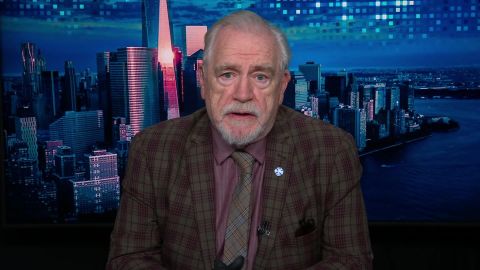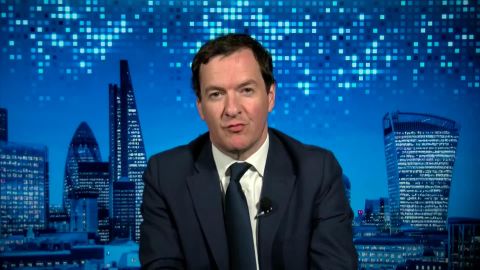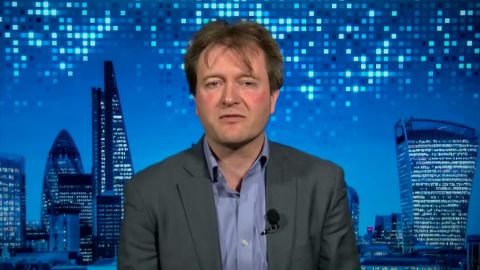Read Transcript EXPAND
CHRISTIANE AMANPOUR: We move now to the United States, where the number of coronavirus cases continues to surge with more than 10,000 Americans currently affected. President Trump, yet again, today called this a Chinese virus, ignoring criticism of his language. And standing alongside FDA officials, he went on to say that a drug used to treat malaria has been approved to test as a treatment for coronavirus. Dr. David Ho is a world-renowned doctor and researcher on the front lines of the crisis. He invented the aids cocktail in the 1990s, a drug strategy recognized as a turning point in the fight against HIV/aids. And now, he’s racing to battle COVID-19, leading four teams working to find a treatment. And he speaks to our Walter Isaacson about it via video communication tool, Zoom.
WALTER ISAACSON: Dr. David Ho, it’s good to be with you. And thanks for joining the show.
DR. DAVID HO, DIRECTOR, AARON DIAMOND AIDS RESEARCH CENTER: It’s my real pleasure. Good to see you again.
ISAACSON: How big of a problem was it not to have tests?
HO: It’s huge. Without the tests, basically, the health care system is operating blind. Not knowing the magnitude of the epidemic, and it’s inexcusable. We watched China struggle for a good six weeks, never realizing — fully realizing that this is going to hit us next. And we’re playing catch-up. And although it’s picking up now, our hospital here in New York could now run a thousand samples a day. A few days ago, it was only 50. And that’s —
ISAACSON: What type of tests are those? And should we be having anybody test, not these tests that take overnight to get a result?
HO: Yes, we need also to test. So, the tests that folks are getting now are called PCR tests, and that’s done on swabs from the nose or the mouth. And we’re looking for the viral RNA. And that’s very useful and that’s what’s been applied. But traditionally, for fighting infectious diseases, we also get antibody tests. And antibody tests will tell you whether a person has been exposed to the virus and the body has mounted an immunoresponse. And that’s extremely useful, and particularly for surveying a population and that’s what we’re rushing to do, in fact, to see if we could get such tests out to huge numbers and truly understand the penetrance of this virus into the community.
ISAACSON: Why don’t we have an antibody or antigen test out there?
HO: It’s an aspect that’s inexcusable. The tests are available in China, in Korea, in Europe, and we’re just in the process of rolling them out and the manufacturers are all from abroad. And so, we’re trying to get this out as quickly as we can, this coming week.
ISAACSON: So, when will those tests be out, where I can just go to a drugstore and say, give me a strip or go to a doctor and have it done in half an hour?
HO: Well, we’re pushing the FDA to see if they would relax their rules, so such useful tests could be applied to a much larger population.
ISAACSON: When you say you’re pushing the FDA, why is the FDA slowing this down?
HO: Well, it — you know, obviously, they’re trying to do their job. They want to make sure the tests are not going to give false results, and that would lead to mismanagement and poor control of the epidemic. So, they are trying to do their job. But on the other hand, the delay is also causing significant harm, because we’re largely blind to what’s going on out there in the community.
ISAACSON: Do you have — at Columbia Medical School where your lab is, do you have antibody test that you could be doing?
HO: Yes. So, we have access point of cure diagnostic tests from several sources in China, in Korea and other places, and we are waiting for the go ahead. And now, we’re just running on a small scale in the laboratory to do what FDA considers validation.
ISAACSON: And you say you’re waiting for the go ahead. Let me press you once again. Do you think the FDA and other authorities to give you that go ahead now, today?
HO: You know, we push every button that we can. Our connections have taken us all the way to the White House to see if we could relax the rules and proceed. It’s pretty clear that the attitude is, we’ll let you do it as soon as possible. And so, it’s coming along. It’s quite different from a week ago. But we still don’t have the final go ahead yet.
ISAACSON: Are there anything holding up the manufacturer of these tests, like a pharmaceutical company who is willing to just turn this out once they’re available?
HO: I know the numbers from one particular source, and I was told that they have the capacity to crank out a million tests a day.
ISAACSON: Wow. What did you think when Jack Ma, the founder of Alibaba, a Chinese billionare, Jack Ma, started donating 500,000 tests to the United States?
HO: My first reaction is how embarrassing for the U.S., for us, to be in this situation. We are a rich nation with a proud history and we pride ourselves as having the best health care system. And now, we are short of tests and short of masks, we’re short of protective equipment for our health care workers. What a tragedy. We should not have been in this position. We should have been well prepared. And this is no doubt a failure in leadership and preparedness.
ISAACSON: And that failure in leadership, was that a lot the CDC and that the Washington, D.C. administration level?
HO: I think I would have to put this on the top of our government. On the other hand, at the local level, I have admired various institutions, universities, schools, public schools, businesses and other institutions struggle and fight this epidemic in a most proactive way, and I’m really grateful and impressed.
ISAACSON: Let’s move for a moment from testing to treatment. When I was at “Time” magazine, as I hope you’ll remember, we made you man of the year for having come up with a combination treatment for HIV/aids. What do you think of the most promising treatment for people already have the disease that are going to be coming along for the coronavirus and COVID-19?
HO: Well, how can I forget what “Time” magazine did in 1996. But in terms of your question, in the short-term, we have only drugs that are currently available, that perhaps could be repurposed to treat this coronavirus. And so, we have one in hand, for example, it’s called renvisamir (ph) and it was initially developed to treat Ebola and it’s now being repurposed, particularly in China, to conduct clinical trials to see if it has any efficacy against this virus. The results are not out yet, but at least based on animal studies, that drug showed some promise. There are other —
ISAACSON: Do you have any hint of how well it’s working in China?
HO: We don’t at the moment because it’s a blinded study with placebo control and they’re enrolling hundreds and hundreds of patients into that study. But we don’t have any readout at this point. There is —
ISAACSON: Do you think we could be manufacturing more of that drug and getting it out to hospitals?
HO: Some of it is available on a compassionate basis. For example, the first patient we have here at Columbia, we were able to get it within 48 hours.
ISAACSON: So, you’re treating patients at Columbia with this. Are you thinking it might help?
HO: Well, we would only use it in severe cases and hoping that it would help. But we certainly don’t know at this point whether it helps or not.
ISAACSON: What did we learn from SARS that we should be applying now?
HO: We learned that SARS could spread very quickly, as we’re witnessing now for this virus. On the other hand, we also learned from SARS that if you apply the infection control measures that are now widespread, you could really flatten the curve and bring the epidemic down, and, in fact, in SARS, you could wipe it out. But, you know, given the magnitude of the current pandemic, I’m not sure that we could wipe this one out, but we could at least try to control it following the same measures. I think there is a lesson that we missed from SARS. SARS told us that the coronavirus could jump species into humans and cause a new outbreak, and we kind of dropped — after SARS went away, we just dropped it and did not pursue research on coronaviruses as much. And if we had done so, we would be much more prepared today to cope with the current epidemic. So, we should not make that mistake again. I think even if we are able to wipe out this epidemic, we must persist with our research effort.
ISAACSON: Do you think that China is now over the hump and do you think people are developing immunity to it (INAUDIBLE) in China?
HO: China is not over the hump. China has done an amazingly impressive job of bringing the epidemic under control. It flattened the curve, now in a country of 1.2 billion, they have around 20 cases a day compared to thousands and thousands elsewhere. And that’s pretty impressive. But, now, China still has some segment of its population carrying the virus, shedding the virus, not totally recovered. And also it’s now surrounded by — quote — “sick neighbors.” And if it should relax the draconian measures, surely, the virus will reemerge. And so the question is, what could China do to mitigate the spread of this virus in a sustainable way? What they have done is impressive, it’s outstanding. However, what’s its next move? And I think we’re all waiting to see that.
WALTER ISAACSON: Do you think there could be new waves of this virus in China and new waves in the United States, if and when the United States gets it under control?
HO: Yes, I think there will be new waves hitting China. And if we manage to flatten the curve, we need to figure out an effective, a sustainable strategy to mitigate further spread. We could flatten it, but if we are applying practices that are not sustainable, we will simply delay the reoccurrence of the virus spreading in our population.
ISAACSON: What would be a sustainable strategy to keep it from recurring?
HO: I think that’s a question that society as a whole needs to answer. You know, at some point, schools have to reopen, businesses as well. And various form of sports, travel, live entertainment, all of those things must come back for us to have some semblance of normalcy. And so, we as a society would need to make those decisions, while trying to keep the spread of this virus to a minimum.
ISAACSON: Are you worried about coronavirus hitting countries like India and other large countries that don’t have great public health systems, and will that keep this plague going?
HO: Yes, I’m extremely worried. What we’re seeing now is the first wave in China coming to a low level, and then the second wave hitting Koreas, Italy, Iran, and then third wave hitting the rest of Western Europe and U.S. And then U.S., we have initial waves on the coast, but now, in the coming days, another big wave hitting Middle America. And this is going to continue to spread across the globe. And at this point, India, South America, Africa are relatively spared, but they should — they are not immune to this. And those waves will simply hit them days or weeks later. And given the density of the human population in India, that’s a huge concern. And, as you mentioned, the health care system in some of these places are not ideal for combating an epidemic of this sort. So, you know, I don’t know what’s coming up there, but I am very concerned.
ISAACSON: Looking back, does this fight have any comparison to your fight against HIV/AIDS?
HO: Well, there are certainly some similarities and some differences. We’re looking at an acute disease that’s gone viral. And HIV is a chronic disease. It progresses very, very slowly in an infected person. This one is just the opposite. But the striking similarity is, is, by the time we detect the first case of HIV infection in 1981, the virus had already spread extensively throughout the U.S. and throughout the world, largely at that time in a homosexual male population. So, the initial cases were just the tip of an iceberg. And now, just thinking back, it was only about two weeks ago we saw the first case in New York City, and now we are confronted with a huge epidemic. And, again, that initial case was just the tip of an iceberg. We are now seeing about 25 percent of the swabs in tertiary kits — you know, nasal, oral swabs being positive for the coronavirus in our community. And if you go out to the suburban areas, it’s 5 to 10 percent. That’s a huge amount of the infection. So whatever official numbers we see, it’s only showing us the tip of a massive iceberg.
ISAACSON: And, finally, how do you think this ends, and when do you think it ends, both in the United States and maybe around the world?
HO: Well, I don’t have a firm answer for that question. Here are my thoughts. I think it’s not likely we’re going to wipe this out by the summertime, as we did for SARS 17 years ago. This virus has already gained such a strong foothold in the human population, including those that reside in the Southern Hemisphere. So, we’re already seeing a lot of cases in Australia, in Argentina, in South Africa. So as this weather becomes warmer in the Northern Hemisphere, it’s going to get cooler in the Southern Hemisphere. And the situation might be just like what we faced with influenza, it’s seasonal, and it jumps back and forth between Northern and Southern Hemispheres. And if that is the case, then it could be that coronavirus would become a fact of life, and we would have to confront this until a solution is delivered through scientific research.
ISAACSON: Dr. David Ho, thank you very much for being with us tonight.
HO: Thank you. And it’s been a pleasure.
About This Episode EXPAND
George Osborne, former UK Chancellor of the Exchequer, explains the state of affairs in London amidst the coronavirus pandemic. Dr. David Ho tells Walter Isaacson about his work to develop a treatment for the virus. Richard Ratcliffe discusses his wife’s temporary release from an Iranian prison. Actor Brian Cox discusses the impact of the pandemic on theatre and the arts.
LEARN MORE



